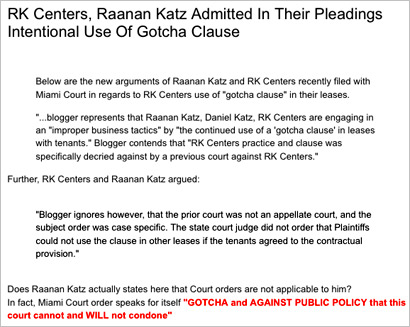Siding with Miami Heat minority owner Raanan Katz, a judge in Florida has taken the rare step of issuing an injunction banning a
blogger from making defamatory posts about Katz.
The blogger's lawyer, Marc Randazza, says the order is an unconstitutional restriction on free speech. "There is almost nothing clearer, under
American law, than the lack of availability of a preliminary injunction to stop allegedly defamatory speech," Randazza says.
The ruling grows out of a dispute between Katz -- owner of the real
estate development company R.K. Associates -- and the author of the blog located at Rkassociatesusa.blogspot.com, which criticizes Katz as a landlord.
Katz sued the blog authors in state court in Florida for defamation. He also filed a
separate lawsuit in federal court in Florida, alleging that the bloggers infringed copyright by posting a photo of Katz on the blog.
When Katz sued, he didn't know the identity of the blog
authors. But after filing the case, he identified one of the blog creators as Irina Chevaldina, a former tenant. (Another defendant was identified in court papers as Dmitri Chevaldine.)
Last
week Ellen Leesfield, a state court judge in Miami-Dade County, issued a preliminary injunction that included a provision banning
Chevaldina and others connected to the blog from "directly or indirectly publishing any blogs or any other written or spoken matter calculated to defame (Katz)."
The libel case hasn't yet gone
to trial, and Leesfield hasn't ruled on whether any of the blog posts actually were defamatory. But legal experts say it's almost always unconstitutional to issue pre-trial rulings banning defendants
in libel lawsuits from speaking.
"I don't see how this order complies with the First Amendment," says Jeff Hermes, Director of the Citizen Media Law Project, hosted by Harvard University's
Berkman Center for Internet & Society. He adds that preliminary injunctions banning future speech are considered prior restraints -- which are almost always unconstitutional.
He says that
another problem with the order is that it aims to prohibit the bloggers from defaming Katz, but figuring out whether particular speech is defamatory is a legal question that bloggers aren't always in
a position to answer. "Somebody who's trying to comply with those orders doesn't know whether what they write would violate them," Hermes says.
In general, only assertions of fact -- and not
opinions -- can be defamatory. But questions about whether a particular statement is meant to be taken as fact, or is just hyperbole, aren't easily resolved.
Almost as soon as the order was
signed, Katz moved to hold Chevaldina and others in contempt for three posts issued in November. Those posts discussed litigation against Katz. But Florida law generally says that discussions about
court proceedings can't be the basis of defamation findings.
For that reason, combined with the other problems posed by the injunction, legal experts don't think that a contempt order would
hold up, should Leesfield issue one. "Only an extraordinarily broad reading of the injunction would support a contempt finding, and it would be on shaky grounds if appealed," says Internet legal
expert Venkat Balasubramani.
